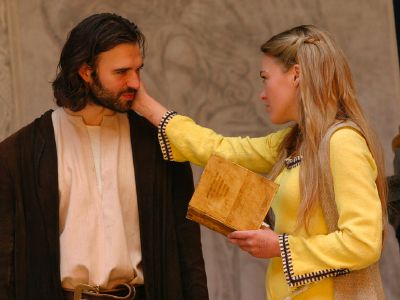In Extremis at Shakespeare’s Globe
A 21st century play (by Howard Brenton), set in 12th century France, featuring passionate debate on the nature of God and man, with the ever-present temptations of sex, power, revenge and authority, rounds off the Globe's 'Edges of Rome' season.

In spanning 2000 years its hard to see this play as 'edgy' – more like it encompasses everything else.
Peter Abelard (Oliver Boot), an articulate questing student at the University of Paris uses Aristotelian logic to confound his teachers and undermine establishment theology. His sharp didactic teaching instantly involves the audience, which is drawn into the philosophical rhetoric. Abelard falls in love with bright young student Elouise (Sally Bretton). Their flagrant and frequent lovemaking causes a scandal.
To keep the peace with Elouise's uncle, Canon Fulbert of Paris (Fred Ridgeway), they marry secretly, but Fulbert becomes obsessed and demands Abelard's castration. The lovers describe themselves as 'philosophical warriors' and are actually way ahead of their time intellectually. For example Elouise does not want to marry as she perceives this will lead to her becoming invisible in the sight of the world.
Fiery Abelard antagonises the all-powerful Church hierarchy, until he is challenged by the ascetic (played by craggily lean Jack Laskey) Bernard of Clairvaux. Do we find God through the contemplation of nature and the universe, or is he to be recognised through reason and logic? a debate which continues even today.
The early 12th century was vigorous but brutal. The Church controlled everyone's lives but new Arabic scholarship was coming from the east. Life was bound to the land but pilgrimage and high office gave opportunities to escape for travel and adventure. The visual arts and church architecture and decoration were flourishing. But there were already calls for the reform of over indulgent monastic regimes, including Cluny. I wonder if the poverty and harshness of the Bernard's Cistercian life is not exaggerated a bit in the play?
The famous confrontation between Bernard and Abelard over doctrine is played as comedy with the Bishops rolling drunk and with a touch of Baldrick. But Abelard throws down his books and defeated retires to Cluny. Elouise becomes an Abbess in her own right, but never forgets her powerful love for Abelard.
The passage of time is cleverly handled between scenes and there are many Shakespearean echoes, especially the rousing final dance. The onstage band is lively with authentic bells and harp but Bill Lyons' delicate recorder is sadly rather drowned by the audience noise. The organ and lute are a century or two later. But the whole is hugely enlightening for a modern audience, engrossing and enjoyable.
Comments
Share
The SE1 website is supported by people like you
More to read
- Dominic Dromgoole to stay at Shakespeare's Globe till 2014 10 Feb 2011
- Reverence: a tale of Abelard and Heloise at Southwark Playhouse 31 Aug 2007
- In Extremis at Shakespeare's Globe 20 May 2007
- Shakespeare's Globe reveals plans for 2007 8 Feb 2007
- Dromgoole reveals his first Globe season 11 Jan 2006
Related forum discussions
- None found. Why not start a discussion?
Follow us
Email newsletter
For the latest local news and events direct to your inbox every Monday, you need our weekly email newsletter SE1 Direct.

